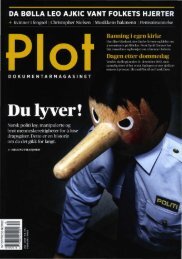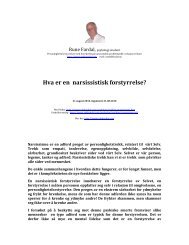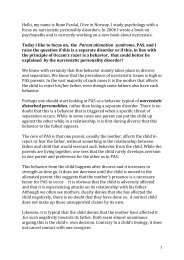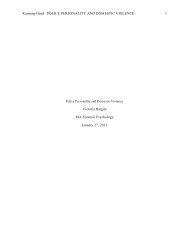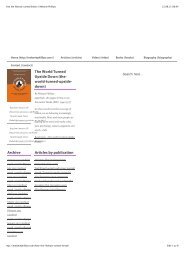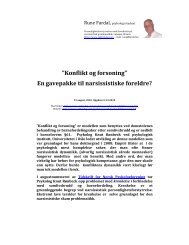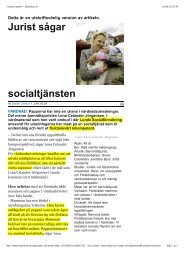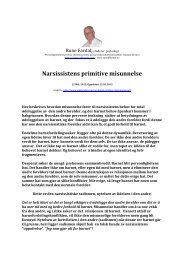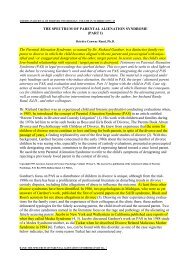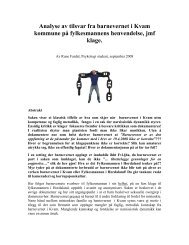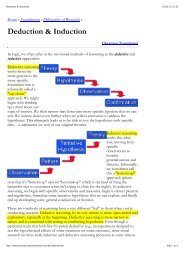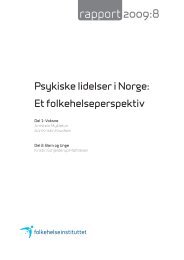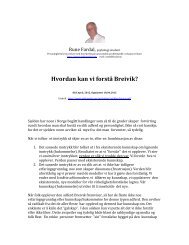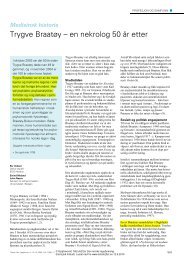The origins of narcissism and narcissistic personality disorder a
The origins of narcissism and narcissistic personality disorder a
The origins of narcissism and narcissistic personality disorder a
You also want an ePaper? Increase the reach of your titles
YUMPU automatically turns print PDFs into web optimized ePapers that Google loves.
48 JOHN S. AUERBACH<br />
viewed, the developmental findings that challenge these notions will<br />
be discussed. Because this research is presented thoroughly by, among<br />
others, Beebe <strong>and</strong> Lachmann (1988), Eagle (1984), Horner (1985), Lachmann<br />
<strong>and</strong> Beebe (1989), Lichtenberg (1983), D. K. Silverman (1986),<br />
<strong>and</strong> <strong>of</strong> course Stern (1985), this discussion will focus on material relevant<br />
to a critique <strong>of</strong> <strong>narcissism</strong>. Finally, a reformulation <strong>of</strong> <strong>narcissism</strong><br />
<strong>and</strong> <strong>narcissistic</strong> <strong>personality</strong> <strong>disorder</strong> consistent with research in developmental<br />
psychology <strong>and</strong> social cognition will be presented. This<br />
reformulation will build on the pioneering efforts <strong>of</strong> Broucek (1979,<br />
1982), Fast (1985), <strong>and</strong> Westen (1990a) to recast <strong>narcissism</strong> in a manner<br />
consistent with the findings <strong>of</strong> empirical psychology, Rejecting as empirically<br />
inaccurate most psychoanalytic thinking about the first year<br />
<strong>of</strong> life, it will emphasize the concordance <strong>of</strong> psychoanalytic accounts<br />
<strong>of</strong> the second year (e.g., the anal stage, rapprochement, transitional<br />
object usage, <strong>and</strong> the mirror phase) with the research literat~re.~ An<br />
additional aspect <strong>of</strong> this reformulation will be a reconceptualization<br />
<strong>and</strong> a possible resolution <strong>of</strong> the Kernberg-Kohut debate.<br />
Primary Narcissism<br />
Assumptions <strong>of</strong> Psychoanalytic Developmental <strong>The</strong>ory<br />
At the risk <strong>of</strong> oversimplification, one might argue that, for Freud, three<br />
dimensions characterize infancy: (a) lack <strong>of</strong> investment in objects<br />
(Freud, 1915/1957, 1923/1961, 1940/1964); (b) undifferentiation from<br />
or lack <strong>of</strong> awareness <strong>of</strong> objects (Freud, 1911/1958a, 1940/1964); <strong>and</strong><br />
While I was completing the final revisions <strong>of</strong> this chapter, I came across<br />
Brouceks (1991) most recent statement on <strong>narcissism</strong>. He reaches the same<br />
conclusion that I present here in reformulating this concept-specifically, that<br />
<strong>narcissism</strong> is a consequence <strong>of</strong> the capacity for self-reflexive awareness, an<br />
ability that emerges in the second year <strong>of</strong> life. Because I did not become aware<br />
<strong>of</strong> Broucek’s most recent ideas until very late in the process <strong>of</strong> preparing this<br />
manuscript, I have not revised the chapter to include them. Even without such<br />
revisions, readers will easily note the influence <strong>of</strong> Broucek’s work on my thinking.<br />
His ideas, <strong>and</strong> those <strong>of</strong> other writers interested in the problems <strong>of</strong> selfreflexivity,<br />
egocentrism, <strong>and</strong> <strong>narcissism</strong> (e.g., Bach, 1985; Blatt, 1983; Westen,<br />
1990a), are central to the argument presented in this paper.



